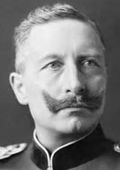The first child of Prince Friedrich Wilhelm of Prussia (later Emperor Friedrich III) and Victoria, Royal Princess of England, Friedrich Wilhelm studied law at the University of Bonn. He succeeded to the imperial throne of Germany on 15 Jun 1888, when his father died after 99 days of reign. In the first years of his reign, Wilhelm II found himself at odds with the politics of powerful Reich Chancellor Otto von Bismarck, whose resignation followed in March 1890 under the pressure of the emperor. However, the governments appointed in the 1890s also failed to find a compromise between the interests of the Reichstag and of the upper classes. In foreign policy, Germany challenged the positions of Great Britain in colonial affairs and its dominance of the seas by implementing the program of building up the German navy, supervised by Alfred von Tirpitz (navy secretary from 1897). Wilhelm's idea of Weltpolitik was aimed at making Germany the world power with strong army and colonial possessions, but it inevitably led to confrontation with Great Britain and its chief allies - France and Russia. Germany entered World War I in 1914. Wilhelm remained a nominal commander-in-chief of the German army throughout the war. On the eve of the revolution in Berlin, he fled to the army headquarters in Spa, Belgium, where he stayed throughout the November revolution. On 9 Nov 1918 the Reich Chancellor Max von Baden issued an unauthorized proclamation about Wilhelm's abdications as emperor and king. Though Wilhelm intended to retain the Prussian crown, the revolutionary events made it impossible. With permission of the Dutch government, Wilhelm moved to the Netherlands, where he officially confirmed both abdications on 28 Nov 1918. The rest of his life he spent in exile in Doorn, the Netherlands. Biography source: [1][2] |

